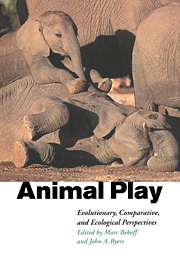Book contents
- Frontmatter
- Contents
- List of contributors
- Introduction
- 1 The evolutionary origins of play revisited: lessons from turtles
- 2 Play in common ravens (Corvus corax)
- 3 Object play by adult animals
- 4 Kangaroos at play: play behaviour in the Macropodoidea
- 5 Intentional communication and social play: how and why animals negotiate and agree to play
- 6 Structure-function interface in the analysis of play fighting
- 7 Sparring as play in young pronghorn males
- 8 Squirrel monkey play fighting: making the case for a cognitive training function for play
- 9 Self assessment in juvenile play
- 10 Biological effects of locomotor play: getting into shape, or something more specific?
- 11 Neurobiological sustrates of play behavior: glimpses into the structure and function of mammalian playfulness
- 12 Play as an organizing principle: clinical evidence and personal observations
- Index
7 - Sparring as play in young pronghorn males
Published online by Cambridge University Press: 20 November 2009
- Frontmatter
- Contents
- List of contributors
- Introduction
- 1 The evolutionary origins of play revisited: lessons from turtles
- 2 Play in common ravens (Corvus corax)
- 3 Object play by adult animals
- 4 Kangaroos at play: play behaviour in the Macropodoidea
- 5 Intentional communication and social play: how and why animals negotiate and agree to play
- 6 Structure-function interface in the analysis of play fighting
- 7 Sparring as play in young pronghorn males
- 8 Squirrel monkey play fighting: making the case for a cognitive training function for play
- 9 Self assessment in juvenile play
- 10 Biological effects of locomotor play: getting into shape, or something more specific?
- 11 Neurobiological sustrates of play behavior: glimpses into the structure and function of mammalian playfulness
- 12 Play as an organizing principle: clinical evidence and personal observations
- Index
Summary
I bruised my shin th' other day with playing at sword and dagger with a master offence; three veneys for a dish of stewed prunes; and by my troth, I cannot abide the smell of hot meat since.
Shakespeare, Merry Wives of WindsorFight on, my men, Sir Andrew says. A little I'm hurt, but not yet slain; I'll lie down and bleed awhile, and then I'll rise and fight again.
Unknown, Ballad of Sir Andrew BartonThere is no dispute that ungulate sparring is somehow less serious than fighting; that it does not constitute a life or death battle. Sparring resembles a fencing match or cooperative dance in which rules are followed. The game is over after three ‘veneys’, or hits, have been made and the wager is not blood but rather a ‘dish of stewed prunes’. Sparring appears to have, at the very least, a mild energy and small risk of injury cost. Such a behavior, if functionless, would have been weeded out long ago and would not be so popular an activity among a wide range of mammals today. What is the wager – spoils gained or lost – in a sparring match between two young ungulate males? To answer this question, we describe the context in which sparring is observed as well as the common participants in both pronghorn and other species in which sparring has been studied.
- Type
- Chapter
- Information
- Animal PlayEvolutionary, Comparative and Ecological Perspectives, pp. 141 - 160Publisher: Cambridge University PressPrint publication year: 1998
- 10
- Cited by



